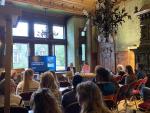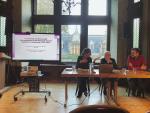
'Was the Holocaust a unique event?' and other questions: lectures by Bob Moore and Dan Michman
Prisoners of War
On 21 October Bob Moore presented on Prisoners of War: Europe 1939 – 1956, also the title of his recently published book. Moore presented on what has long been, and he argued still is, the vastly under-researched topic of soldiers who were captured by both Allied and Axis powers during World War II. A thematic discussion of the topic of POWs drew everyone’s attention to various avenues for further study.
Moore discussed comparable and non-comparable cases, as well as suggested reasons for discrepancies in the treatment of POWs. For example, Moore explained, German troops ‘forcibly civilianised’ captured Polish soldiers after the Polish state was deemed not to exist. At the same time, Polish officers were not civilianised, and held for the entire duration of the war. Polish soldiers who fought for the Allies were also not civilianised, and treated in line with the 1929 Geneva Conventions regarding POWs, though the only difference was their uniform.
German propaganda photos
Moore posited thought-provoking hypotheses about potential reasons for some of these discrepancies, such as concern with the safety of German captives in Allied hands, and the desire to use soldiers as forced labour to support the war effort. German propaganda photos of female POWs raise interesting questions regarding both the role of women in the war, and perceptions of the role of women in the war. Moore explained that women caught in uniform with arms were treated by the Germans as partisans and shot on capture. So how, then, to approach and explain these propaganda photos?
Finally, the experience of Soviet soldiers captured and held as POWs in ‘the west’ was steeped in a stigma that Moore’s research has shown continued long beyond not only the end of World War II but also the end of the USSR. Rumours in Western Europe about secret Soviet POW camps containing ‘missing’ prisoners (who had in fact died at the front) was also a persistent part of post-war rhetoric, demonstrating the impact of the Cold War on memories and narratives about POWs in World War II.
Was the Holocaust a unique event?
Dan Michman lectured on 24 October concerning Holocaust Uniqueness, 1933 – 2022. Beginning with the semantics of the many different terms used to describe the events of World War II, Michman demonstrated that every term is laden with both implicit and explicit assumptions. From a historiographical point of view the real question when trying to ‘label’ the Holocaust becomes: ‘what is the core?’.
Depending on perception of the main event of the war years on either an individual or societal level, the implications contained within its terminology will differ. Michman went on to ask a second key question, whether the ‘core’ of the Holocaust is particularist, or universal? And are these explanations necessarily rival explanations? Can the particular become universal? If we argue for uniqueness, uniqueness within what? Compared to what? Analysing almost 70 years of post-Holocaust scholarship, Michman warned against the fervent creation of ‘models’ without acknowledgements of what those models may fail to include, or indeed deliberately exclude.
Perpetrators, systems and bureaucracies
An overview of post-war academic analyses revealed tendencies to focus on perpetrators (Adorno), systems (Arendt), and bureaucracies (Hilberg). All models were useful or important in their own way and in their own time, Michman argued, but cannot still be held up as pure models of understanding when the need for nuance is so much better understood. The silences these models perpetuate is evident, and a continued attempt to fit Holocaust scholarship into them can only weaken the quality of our understanding of that history.
Michman’s comments evidently proved thought provoking for many, as questions were fielded after his lecture regarding Jewish universalist/particularist debates, comparisons of colonialism to the Holocaust, and the political utility of the use of certain terms to describe the Holocaust, and the salience of those terms geographically and temporally.

Michman demonstrated that the use of a universalist understanding of the Holocaust was seen as critical by Jewish rescue activists during the war. This raised the question of under what conditions certain perceptions of the Holocaust might become salient in contemporary times, particularly given the current discussions of other loaded terms like ‘genocide’ being used by Vladimir Putin to try and justify the invasion of Ukraine in February 2022.
Both lectures provided immense food for thought for all those in attendance, having dealt not only with Holocaust history but the history of Holocaust memory, and its impact on how we study (or do not study) certain aspects of the Holocaust. The question of silence and political manipulation of war memory and Holocaust memory was clearly present in both lectures. The lecture attendees were left not only with questions and avenues for potential future research, but questions regarding how they might reflect on their own engagement with historical sources from World War II, and how they might grapple with these issues in their own scholarship.